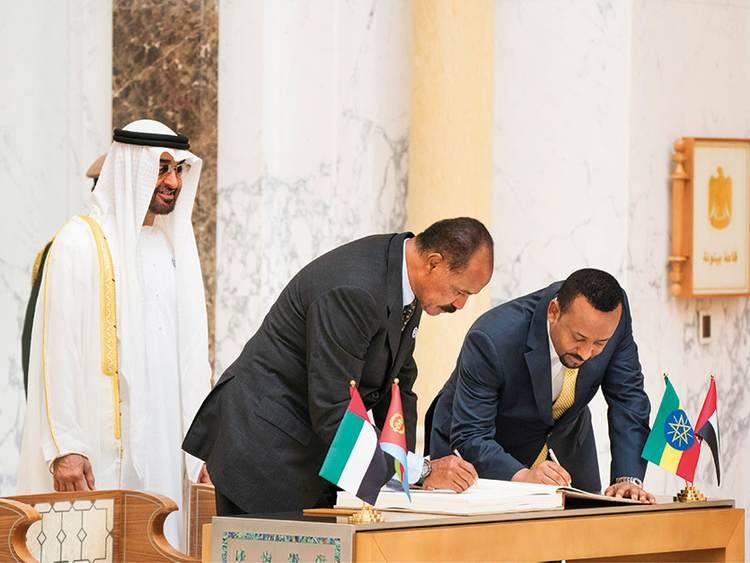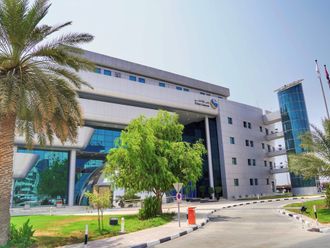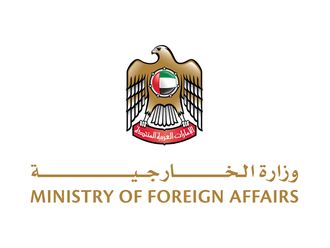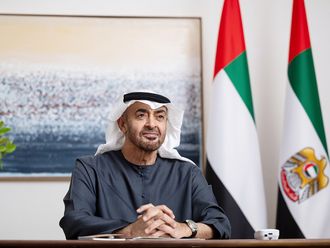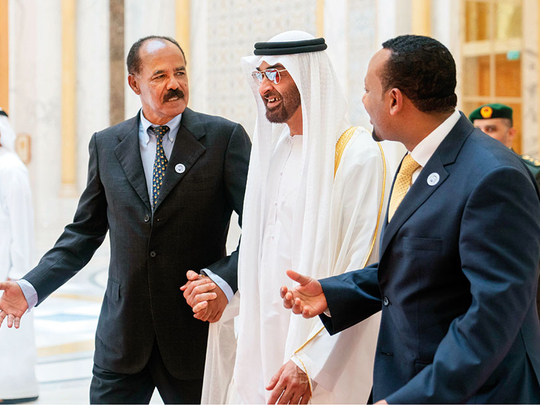
Abu Dhabi: The UAE on Tuesday praised the bold and historic peace step taken by the leaders of Eritrea and Ethiopia to end their decades-old conflict and normalise rations.
While hosting the leaders of the two countries in Abu Dhabi on Tuesday, His Highness Shaikh Mohammad Bin Zayed Al Nahyan, Crown Prince of Abu Dhabi and Deputy Supreme Commander of the UAE Armed Forces, said the peace deal would result in cooperation and coordination between the neighbours and help meet their citizens’ aspirations for peace, development and prosperity, as well as enhance security and stability in the Horn of Africa and the wider region.
Prime Minister of Ethiopia Abiy Ahmad and President of Eritrea Isaias Afwerki were accorded a warm welcome by Shaikh Mohammad Bin Zayed at the Presidential Palace here on Tuesday.
On the rapprochement between the two Horn of Africa countries, Shaikh Mohammad said the two neighbours and their leaders had demonstrated the will and determination to normalise relations and overcome many years of conflict and instability.
“This is a model that can inspire others and ought to be used to resolve conflicts in Africa and other parts of the world, thus enhancing regional security and stability and opening wider areas of cooperation,” he said.
He also noted that the UAE leadership and their people would be delighted to see all parts of the world becoming peaceful, secure and prosperous.
“The UAE is prepared to actively assist in the process of restoring peace, coexistence and development,” he added.
Eritrea and Ethiopia have been involved in hostilities for nearly two decades since fighting began between the two African neighbours in 1998 over a border dispute.
The conflict killed more than 80,000 people and at least 350,000 people living along the border on both sides were uprooted and forced to flee.
After thawing of relations earlier this month, leaders from both the countries have visited each other, and last week Eritrea reopened its country’s embassy in Addis Ababa.
Ethiopia’s national carrier Ethiopia Airlines also made its first flight to Asmara in two decades bringing joy on the faces of thousands of people from both the countries.
The two countries are also set to play a friendly football match next month.
Earlier this month, Dr Anwar Gargash, UAE Minister of State for Foreign Affairs, said in a tweet that UAE has become a major partner in the Horn of Africa and the leader of the Arab presence there.
UAE companies are also increasing their presence in the region.
DP World is planning to set up a logistics facility in Ethiopia to facilitate transport of goods to landlocked countries in Africa.
Theodore Karasik, an expert in Middle East Affairs, said the UAE’s ability to bring together are Ethiopia and Eritrea at this moment is highly significant for the country’s strategy and also for the future of the Red Sea and shipping.
“Emirati vision when it comes to maritime affairs is a rising and important factor. Both Ethiopia and Eritrea are major players in the horn and rectifying their differences has put Abu Dhabi out in front in a very positive manner,” he told Gulf News.
Shaikh Abdullah Bin Zayed Al Nahyan, UAE’s Minister of Foreign Affairs and International Cooperation, also welcomed the re-establishment of diplomatic ties between Ethiopia and Eritrea.
In a statement on WAM on July 9, Shaikh Abdullah said: “The re-establishment of diplomatic ties will have a positive impact on the security and stability of the two countries in particular, and the Horn of Africa in general.”
He praised the historic step taken by Ahmad and Afwerki, adding that this move represents great political wisdom and courage of the two leaders.
Afwerki also held talks with leaders in Saudi Arabia before coming to Abu Dhabi.
— With inputs from Reuters
Leaders honoured with Order of Zayed
President His Highness Shaikh Khalifa Bin Zayed Al Nahyan on Tuesday bestowed the Order of Zayed upon Eritrean President Isaias Afwerki and Ethiopian Prime Minister Dr Abiy Ahmad, in recognition of their efforts to end conflict between their countries and contribute to peace and stability in the region.
His Highness Shaikh Mohammad Bin Zayed Al Nahyan, Abu Dhabi Crown Prince and Deputy Supreme Commander of the UAE Armed Forces, presented the Order to the two leaders. He praised the efforts of the two African leaders to establish security and stability.
Afwerki and Ahmad said they were proud of being honoured with this order, and that they appreciated the UAE’s efforts in supporting peace and development in their countries, as well as its role in building bridges of friendship, cooperation and peace with different nations. Shaikh Mohammad Bin Zayed then hosted a lunch banquet in honour of Afwerki and Ahmad.
Ethiopia-Eritrea: Détente follows decades of discord
A tripartite summit in Abu Dhabi on Tuesday and the resumption of commercial fights between Ethiopia and Eritrea earlier this month marked the latest step in a peace process that in just six weeks has drawn a line under a bitter conflict. Here is a recap of the standoff between the Horn of Africa neighbours and their fast-track reconciliation:
1962: Ethiopia’s last emperor, Haile Selassie, proclaims the annexation of Eritrea, effectively making it a province. Eritrea launches a war for independence that lasts nearly 30 years.
1991-93: Eritrean rebels, who help overthrow the military-Marxist Ethiopian regime of Colonel Mengistu Haile Mariam, seize the Eritrean capital Asmara. They gain full independence in 1993, a secession blessed by Addis Ababa. However the 1,000km border between the neighbours is not properly defined and the move deprives Ethiopia of its only entry point to the Red Sea.
May 1998: Skirmishes erupt after Eritrean forces enter the area around Badme, claiming the town under borders drawn during Italian colonial rule. Fighting spreads and in June the warring sides carry out air strikes. The ensuing conflict is marked by trench warfare and large-scale pitched battles, alternating with long periods of calm.
May 2000: Fighting flares anew. A fierce bombardment of Eritrea turns the conflict in favour of Ethiopia, while indirect negotiations resume in Algiers. The fighting costs 80,000 lives.
June 2000: The two sides reach an initial peace accord that allows for the deployment of a UN peacekeeping force in a border buffer zone.
December 2000: A peace pact sets up a Boundary Commission based in The Hague.
2002: The commission attributes to Eritrea chunks of land along the border, including Badme. But Ethiopia rejects the ruling and requests an “interpretation, correction”. The commission refuses. Ethiopian forces continue to occupy Badme. The standoff delays the physical demarcation of the border.
May 2006: Amid fears of a new all-out war, talks in London fail to end the standoff. In June Ethiopia claims to have killed more than 110 rebels allegedly sent by Eritrea, which it denies.
June 2018: Ethiopia’s new prime minister Abiy Ahmad, announces his country will abide by the 2002 ruling requiring it to cede territory, including Badme. The decision launches a whirlwind peace process.
July 8: Eritrean President Isaias Afwerki hosts Abiy in Asmara and cheering crowds line the streets. The leaders says they will reopen embassies and borders between them, resuming diplomatic, trade and transport ties. Direct telephone communications are restored for the first time in two decades.
July 9: The neighbours say the “state of war that existed between the two countries has come to an end.”
July 16: Afwerki re-opens Eritrea’s embassy in Addis Ababa, at the end of an emotion-filled three-day stay in Ethiopia.
July 18: An Ethiopian Airlines plane departs for Addis Ababa as commercial flights between the capitals resume.
July 24: Shaikh Mohammad Bin Zayed hosts a tripartite meeting with President Afwerki and Prime Minister Ahmad in Abu Dhabi. Shaikh Mohammad praises the historic step taken by the two leaders to end their conflict, and says the UAE supports every effort to achieve peace and stability worldwide as the key to sustainable development.
— Compiled from WAM & AFP


